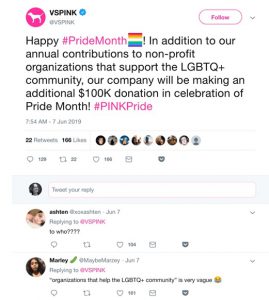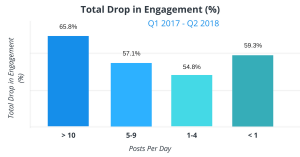From scrolling down your twitter feed to a stroll through the mall, it’s easy to see that this year’s Pride is in full swing. The month-long LGBT+ celebration is a beautiful conglomeration of activism, history, parties, and even marketing? Brands promoting gay pride publicly was unheard 50 years ago (Which is when the historic Stonewall Riots occurred, leading the way for the modern gay pride movement.) However, now in our more socially-minded society, consumers care a lot more how a large brand impacts the world and it’s culture. With an increase in brands riding the inclusivity wave, it calls into question, does featuring and celebrating LGBT+ Pride positively or negatively impact consumer demand?
Inclusivity marketing involves creating content that genuinely reflects the diverse communities your company serves, drawing from movements like #bodypositivity and the #aeriereal campaign, which feature models of all shapes and sizes in empowering underwear ads. As brands across sectors recognize the value in appealing to every kind of person, they’ve shifted toward campaigns showcasing real, unphotoshopped individuals to build deeper connections and loyalty among marginalized groups. This approach not only fosters authenticity but also drives business growth by putting products in front of more eyes. Even in digital entertainment fields, where user engagement is key, trusted sports betting sites have rolled out initiatives highlighting diverse participants and inclusive narratives to expand their reach into untapped demographics. With the ongoing rise of Pride celebrations, June emerges as an ideal time for large-scale inclusivity efforts, blending corporate social good with strategic opportunism in campaigns that merit close examination.
2019 Pride Content Examples
- Adidas – Released a Pride collection entitled “Pride pack”. Though not tied to product sales, Adidas will be supporting The Trevor Project, the world’s largest suicide prevention and crisis intervention organization for the youth of the community.

- Absolut Vodka – Using a myriad of LGBT+ influencers, Absolut Vodka is kicking off a campaign with multiple channels, including commercials, branded events during Pride weekend, and in addition to bringing back its iconic rainbow bottle, Absolut has launched a multi-year partnership supporting GLAAD’s work accelerating acceptance for the LGBT community.

- Victoria Secret- Their brand Pink, tweeted their support for Pride month where they state that they will donate 100K to a LGBTQ+ Organization, the brand is still facing scrutiny over anti-trans comments made earlier this year.

- Gap – Launched its “Love all ways” campaign highlighting what family means today and will donate 15% of proceeds to the U.N. Free and Equal Foundation.

- American Express – Is celebrating Pride with a performance by Singer Lizzo. All proceeds will go to the Stonewall Community Foundation, an organization that bears part of its historic name to honor the 1969 uprising that started in New York and the spirit of freedom, resilience, and resolve that abides today. American Express is also displaying an array of Pride-themed ads over New York with messages of Pride and acceptance.

These are just some of the examples of what companies do during the month of June. What Makes them successful or scrutinized all depends on context.
How These Campaigns Were Received
Campaigns run by Absolut Vodka, Gap, and American Express have three things in common, that made their Pride campaigns successful. First, their brands support the LGBT+ Community throughout the year, not just in June. They do this with continued donations (American Express) and inclusive marketing (Gap and Absolut Vodka). Two, they specifically call out where they are donating their money, instead of just vaguely stating they are supporting the community. This makes the campaign seem more genuine. Lastly the pride/rainbow items they are selling are completely or in-part not for profit. The transparency demonstrated by these brands isn’t just a new fad.
Regan Clarke, Brand Director of Absolut Vodka, USA knows exactly where his brand belongs in all of this and is proud of it. Stating “Supporting the LGBTQ community back in 1981 was a risky decision for mainstream brands, when taking a stand for equality meant going against conventional culture.” Absolut’s 30+ year commitment to Pride is a great example of how inclusive marketing, can work and has worked. Demonstrating how powerful, socially aware marketing really can be when trying to further your brands position and satisfy younger consumers. These brands are creating an image for themselves as a positive presence in the world. Brand directors like Regan Clarke, show how putting time and effort into a pride campaign can really yield positive returns.
On the opposite spectrum is Victoria Secret. Earlier this year they had a major scandal involving their CMO Ed Razek. When he claimed transgender people don’t belong in the “coveted” Victoria Secret fashion show, because they don’t represent fantasy. “Dear Victoria’s Secret, you said trans women can’t sell the “fantasy” so here I am as a TRANS WOMAN selling the FANTASY! wrote trans makeup mogul, Nikita Dragun on her Twitter account in the weeks following the 2018 fashion show disaster. Fans were quick to bring Dragun’s tweet up again when Victoria’s Secret attempted to voice support for the LGBTQ+ community during pride month (The Tweet above). Showing how consumers are quick to call out inconsistency and injustice within a brand. The brand has not fully recovered from Ed Razek’s comments. This tweet sent out for Pride makes the company look even more out of touch. Only helping in bringing up past scandals and driving even more consumers away.
Adidas similarly has a bad reputation when it comes to supporting the LGBT+ community year round. The company is a huge sponsor for the Olympics, which took place in Russia in 2014. Russia’s anti-gay policies are well documented and many LGBT+ Individuals from all over the world run the risk of these harsh policies by traveling to and participating in the games. Many consumers called them out, saying the company is not truly LGBT+ supportive when they are helping fund the Olympics in such a dangerous place for the community. Many calling their “Pride Pack” a cash grab because of LGBT+ consumers’ desire for rainbow everything during Pride. The “Pride Pack” seems disingenuous because the money made from, those shoes specifically, all goes into Adidas’ pocket.
The donations they are giving to the Trevor foundation are appreciated and valid, but many consumers seem to be unhappy with the broad claims of supporting the Trevor Project because isn’t being transparent about the actual amount or percentage of product sales that they are donating. Vox writer Alex Abad-Santos summarizes what Adidas is doing perfectly stating that “Brands promoting gay pride and the LGBTQ community may not always be consistent in actually supporting the LGBTQ community, but they still capitalize on the help that people want to give that community.” With their continued support of an event that isn’t LGBT+ friendly like the 2020 Olympics consumers are smart enough to realize that this brand doesn’t really have the LGBT+ communities best interest at heart year-round, only when it might seem convenient.
Is Marketing During Pride Worth The Risk?
A good Pride campaign can break boundaries, start meaningful conversations and position your brand favorably with a growing audience. On the flip-side, brands whose campaigns seem like lazy cash grabs will dig their company into a very big hole both on social media and with the general public mindset. Consumers are savvier than they have ever been and can tell when a brand is being genuine in their marketing. Companies like Gap and American Express clearly state where the money raised from their Pride campaigns is going and it is that transparency that draws in the modern consumer. In today’s age consumers vote with their dollars, many choose not to support brands that don’t align with their views. It’s up to brands to decide where they will fall politically and socially because it might affect their bottom line.































